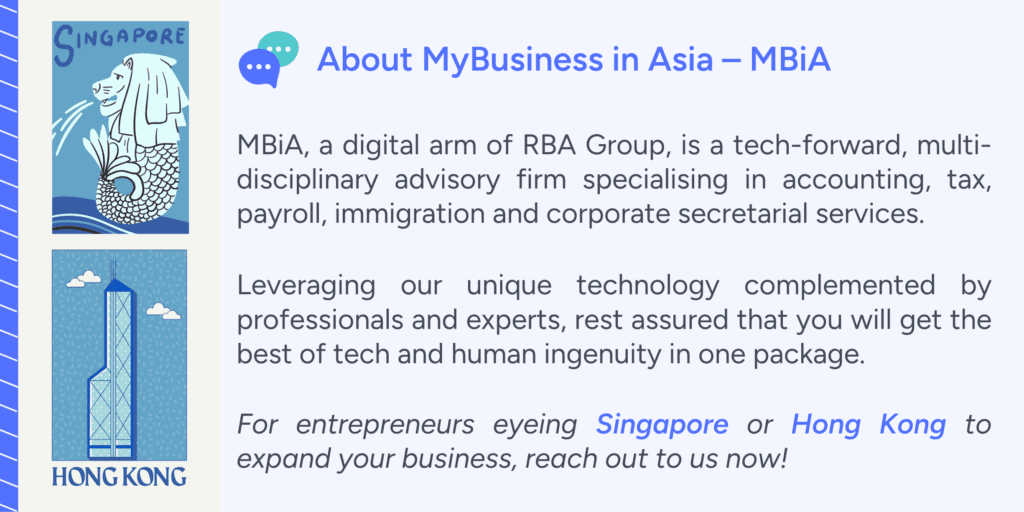Singapore is well-known for its pro-business environment, offering a range of tax benefits designed to attract entrepreneurs and companies from around the world. By incorporating your business in Singapore, you can take advantage of these generous schemes to significantly lower your tax burden and improve profitability. Whether you’re a start-up or an established company, Singapore’s tax incentives help free up capital, which you can reinvest to grow your business.
In this article, we will explore the key tax benefits of incorporating in Singapore, focusing on the Start-Up Tax Exemption (SUTE) and Partial Tax Exemption (PTE) schemes, among others, which make the country an attractive destination for entrepreneurs.
Overview:
- Understanding Singapore Corporate Tax Exemptions
- Start-up Tax Exemption (SUTE)
- Partial Tax Exemption
- Corporate Income Tax (CIT) Rebate
- Foreign Sourced Income Exemption Scheme (FSIE)
- Pioneer Certificate Incentive (PC)
- Development and Expansion Incentive (DEI)
- FAQ
- You might also be interested in
Understanding Singapore corporate tax exemptions
Singapore’s corporate tax is set at a flat rate of 17%, designed for simplicity and clarity for investors.
However, there is much more to it. To promote entrepreneurship and attracting foreign investments, Singapore government have established legislations to provide many tax benefits for companies incorporated in Singapore.
Start-up Tax Exemption (SUTE)
The Start-Up Tax Exemption (SUTE) is an excellent example of Singapore’s strong commitment to supporting new businesses. Eligible start-ups under SUTE can benefit from a 75% tax exemption on the first S$100,000 of chargeable income, followed by a 50% exemption on the next S$100,000 for the first three consecutive Years of Assessment (YAs) from incorporation, as outlined in the 2024 regulations.
This exemption applies to the company’s first three consecutive YAs, beginning from the first YA, regardless of whether the company has generated chargeable income. Therefore, if a company only begins earning chargeable income in its third YA, it will still qualify for a single year of tax exemption under SUTE.
To qualify for SUTE, start-ups must meet the following criteria:
- Be incorporated in Singapore
- Be a tax resident in Singapore for the relevant financial year
- The company’s total shareholding is held by no more than 20 shareholders during that financial year, where:
- All shareholders are individuals, or.
- At least one shareholder is an individual holding a minimum of 10% of the issued ordinary shares.
Qualifying start-ups incorporating from 2020 onwards will have SUTE applied as such:
| Chargeable Revenue | Percentage Exempted from Tax |
|---|---|
| First $100,000 | 75% |
| Next $100,000 | 50% |
Partial tax exemption
After the initial three years of Start-Up Tax Exemption (SUTE), new companies and start-ups can still benefit from the Partial Tax Exemption (PTE). Even companies that do not qualify for SUTE can take advantage of the PTE, provided they meet the eligibility criteria.
As of 2020, qualifying companies can enjoy:
- A 75% tax exemption on the first S$10,000 of chargeable income.
- A 50% exemption on the next S$190,000 of chargeable income.
Corporate Income Tax (CIT) rebate
As of 2024, this CIT rebate has been phased out, meaning businesses will no longer receive the annual rebate they once enjoyed.
Foreign Sourced Income Exemption Scheme (FSIE)
While foreign-sourced income is generally subject to tax for Singapore companies, the Foreign-Sourced Income Exemption Scheme (FSIE) offers significant relief by mitigating tax liabilities in this area.
To qualify for FSIE, the foreign income must meet two key conditions:
- It must have already been taxed in the source country at a minimum corporate tax rate of 15%.
- It must be deemed beneficial to the Singapore-resident taxpayer.
A Singapore-incorporated company can benefit from FSIE on the following types of foreign income:
- Foreign-sourced service income: Income earned by a resident taxpayer for providing services to a foreign country.
- Foreign branch profits: Profits earned by a Singapore-incorporated company that operates as a branch of a foreign entity. Non-business or non-trade income from a foreign branch does not qualify.
- Foreign-sourced dividends: Dividends paid by a foreign company to a Singapore resident, deposited into a foreign custodian account before remittance into Singapore. These dividends must be brought into Singapore within one year of their transfer to the custodian account.
By meeting these criteria, Singapore companies can effectively reduce their tax obligations on foreign-sourced income, supporting global business expansion efforts.
Pioneer Certificate Incentive (PC)
The Pioneer Certificate Incentive (PC) is designed for companies recognized as pioneers in their industry, typically because their expertise or activities are more advanced than what is currently available in Singapore.
Qualifying companies under the PC can benefit from a concessionary tax rate of 5% on their qualifying income for up to five years. This incentive supports innovative businesses, encouraging them to contribute to Singapore’s economic development by introducing cutting-edge activities or technologies.
Development and Expansion Incentive (DEI)
The Development and Expansion Incentive (DEI) offers a reduced tax rate of 5% for up to ten years to companies that commit to significant growth and contribute positively to Singapore’s economy. This incentive is designed to encourage businesses to invest in local development and expansion activities that generate broader economic benefits.
While this article provides a glimpse into some of the key tax incentives available in Singapore, the full range of financial advantages for businesses in this dynamic city-state is vast. Numerous other tax exemptions and incentives exist for savvy investors who know how to navigate the system effectively.
If you’d like more detailed guidance from our expert team of lawyers, bankers, and accountants, feel free to contact us. We can help you unlock the full benefits of Singapore’s business landscape, saving you time, money, and unnecessary complications.
FAQ
The companies operating in Singapore, may be considered tax resident or a non-resident for income tax purposes. This is important because tax residents enjoy certain benefits and privileges that non-residents do not, such as lower tax rates, tax exemptions, and tax reliefs.
According to the Inland Revenue Authority of Singapore (IRAS), a company is a tax resident in Singapore if the control and management of its business is exercised in Singapore. This means that the strategic decisions of the company, such as those relating to policy matters, finance, and business operations, are made by the directors or senior management in Singapore.
The location of the company’s incorporation, registration, or head office is not relevant for determining its tax residency status. Similarly, the place where the company’s income is derived or received is also not relevant.
You might also be interested in
- Making Sense of the Dividends Taxation and Regulations in Singapore
- Navigating Singapore’s E-commerce Tax Regulations: A Comprehensive Analysis
- What is GST in Singapore?


